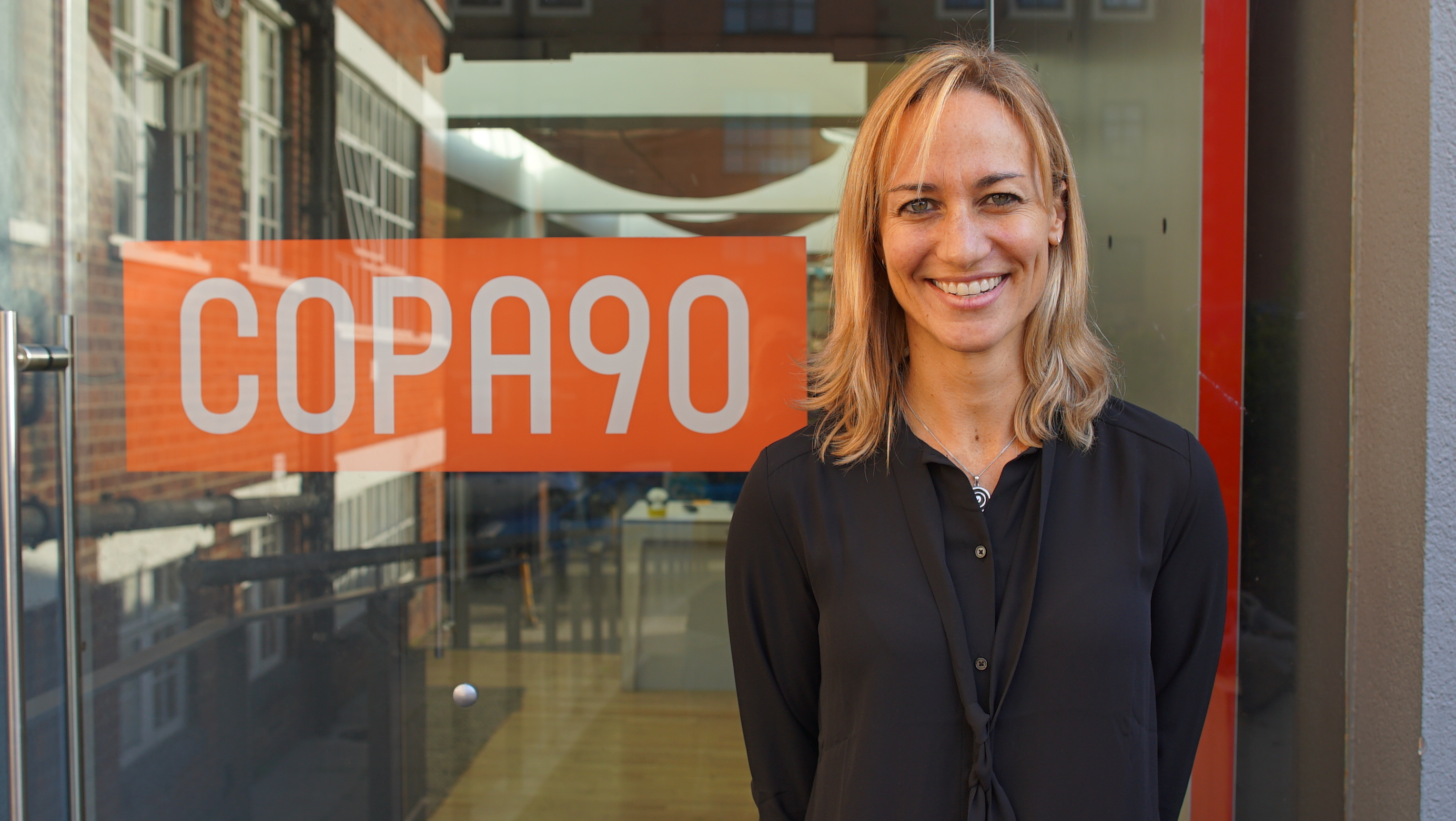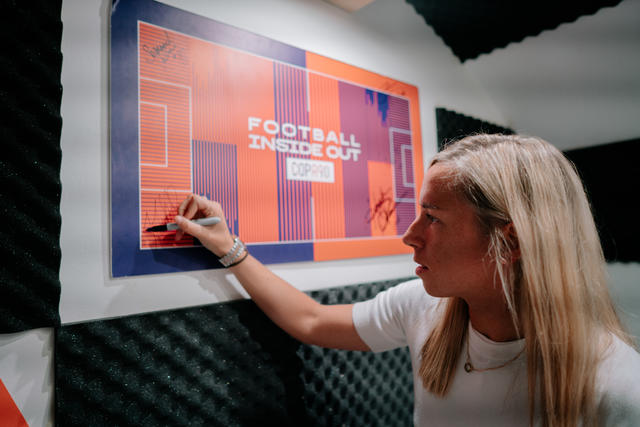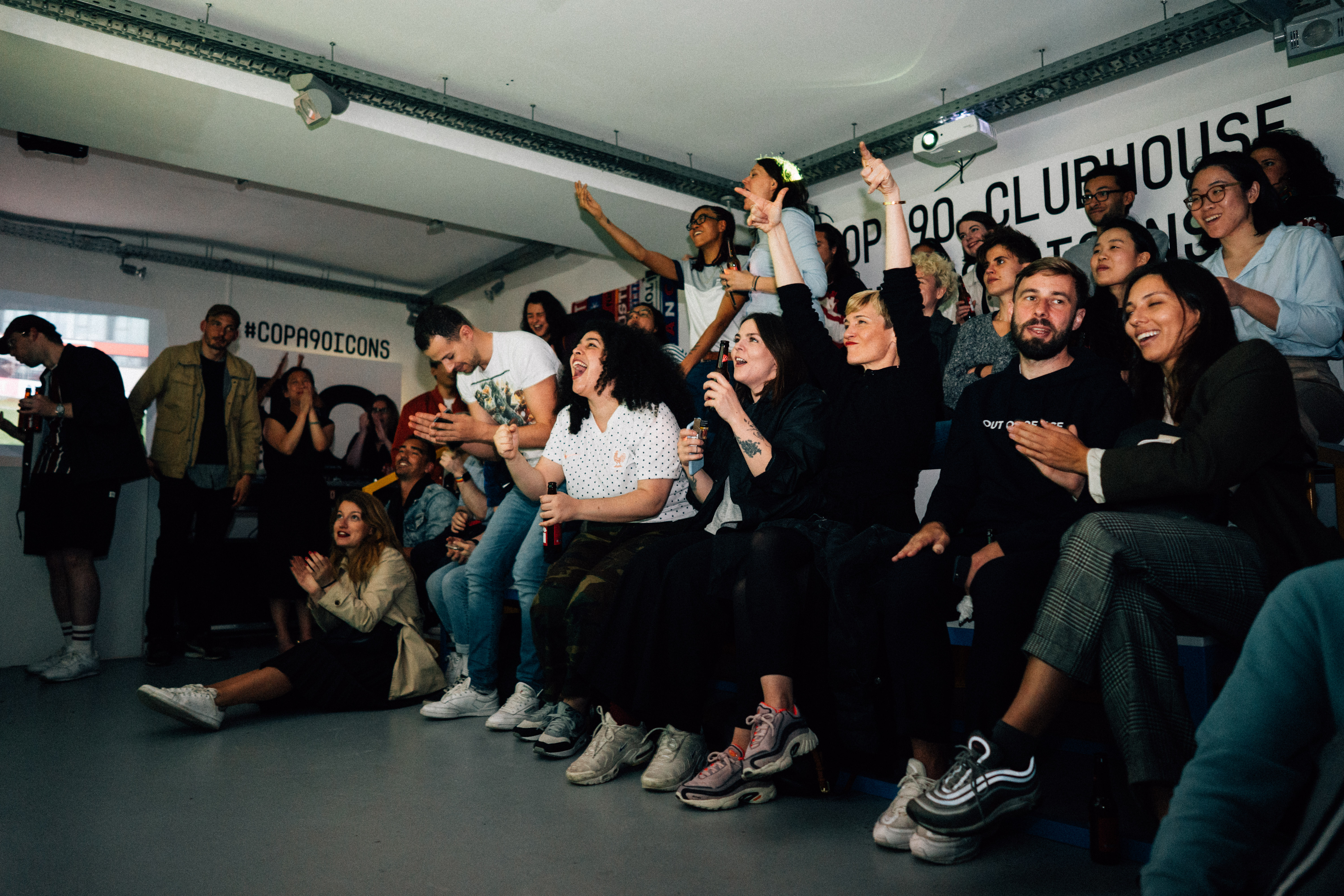Almost a month before WFS19 our speaker Rebecca Smith, COPA90‘s Global Director of the Women’s Game, talked to WFS about the women’s football growth, Megan Rapinoe’s social activism, the next steps for brands and her opinion about Real Madrid getting a female team.
You are a former football player and joined COPA90’s team at the beginning of the year as the media firm’s first global executive director of the women’s game. What’s your role in the company and how was working at the last World Cup?
COPA90 is the global authority on Football culture. We elevate and champion with world-class storytelling from an unrivaled fan perspective. COPA90 has always had a broader definition of football whether it’s been including the fan perspective or doing pieces like about Transgender football in Mexico, they’ve always been inclusive and celebratory storytellers of the beautiful game. Not the typical 90 minutes, but also all the incredible stories around the 90 minutes that make the 90 minutes more interesting. I think the women’s game has not been a massive focus for traditional media in general, and it’s been missing out on some of the best stories in football because of it. COPA90 had recognised the marginalization of the women’s game in traditional media and, being the innovative and disruptive brand that it is, hired me to help initialize the process of including women’s football into the definition of football. I’ve been helping to create a network to tap into the clubs and the players, bringing more insight into the women’s game and aligning the company closer to being that authentic, credible voice in the women’s game or, as we like to say, the broader definition of football.

We went huge into the World Cup and posted more than any non-rights holder in the world. We had clubhouses, one in Paris then moved it to Lyon, that not only screened every single match of the World Cup, but also held various events with different touchpoints like fashion, music, art and grassroots football encouraging brand new audiences into the sport. Fans from over 40 countries in the world could come in and watch the game, hang out, have a good time and realize that not only COPA90 but women’s football and football, in general, is so much bigger and more diverse than what we’ve traditionally seen.
The recent World Cup marked a real turning point for women’s football. Why do you think this has happened just now? Has it been casual or a result of coordinated efforts and strategies?
Football and the growth of any aspect of football, like the women’s game is a result of an entire ecosystem. It’s not only traditional media like the broadcasters, but also big global brands waking up to the opportunities within the game, the governing bodies, the clubs, fans, and players all playing their part. It felt like this summer, there were more elements of this ecosystem waking up to the opportunities the women’s game has to offer. And I think that it also has to do with the increase in quality of the game because of the investment that’s gone into the grassroots level, coaching and structures from the last 10 years. Lastly, due to more interest, I think that there’s more visibility around the game about who these players are and the stories around them. And once you understand this sport, you can’t help but kind of fall in love with the characters and that’s what happens on the other sports. It’s been sort of a blind spot in sportsfor so long that now there’s more visibility, there’s more respect that comes with it.
«I think that in football specifically, it’s rife with having a very one-dimensional type of decision-makers. A lot of times it’s mostly males making decisions on showing men’s sport for a male audience and perpetuates a cycle.»
What are the biggest barriers that women’s football still needs to break?
I think a lot of it is just the mentality. It’s just a cultural change that needs to shift. I think people have stereotypes of the women’s game or the opportunities of the women’s game that are not accurate and the visibility of the World Cup has helped debunk some of these. I think that once people can understand the opportunities in the women’s game, the audiences who love the stories and the sport, and the massive opportunity for growth, that’s what is going to push the game forward much quickly. Also, everywhere across football, decision-makers need to be more diverse. I think that in football specifically, it’s rife with having a very one-dimensional type of decision-makers. A lot of times it’s mostly males making decisions on showing men’s sport for a male audience and perpetuates a cycle. Once you have a more diverse decision-making body, in gender, race, religion, orientation (the list continues…), you’re going to be much more inclusive, be more aware of new opportunities in football, and make better decisions for the whole sport. And that will include the women’s game, and include women in decision making positions.

A lot of brands are jumping on board of women’s football, especially after France 2019. Do you think these interests are genuine and will continue until the next World Cup?
I hope that brands understand that this journey is not just a one-stop,throw money at the World Cup, moment but more like a start-up and the beginning of the journey that needs investment and will have a longer term return on that investment. I also think that brands need to do storytelling in the right way, for both the sport and for the brand. The storytelling has to be authentic and it has to be credible and in order to have that, you have to be quite close to the game and have a pulse on the game. The brands take a risk coming to the space and not knowing the reality of the game, which can be challenging when there’s such a lack of visibility of the sport, the stories, the players within it. I think brands shy away from that because of the lack of knowledge. That’s where we as a company are really trying to help brands in the space and plug them into the pulse and the heart of the women’s game globally so that it feels like a safe space. If you get the wrong tone, in a patronizing or CSR way, it’s not going to be credible or authentic. If you get it right, you’re opening your brand up to an entire new, passionate and engaged audience.
What messages can women’s football provide for brands? What values can women’s football add in comparison with male football or other sports?
I think that the characters are incredible. I am biased, for being an ex-player and knowing some of these players personally. I think that having someone who’s a role model for boys and girls as ambassadors for your brand is extremely valuable. The stories that they tell and what they stand for is a lot deeper and more diverse and broader than in some of the other sports in the world. Some of the storytelling and the values that these players have are very positive and they’re on the right side of history championing equity and the positive benefits of sport and teamwork in general. And I think that most brands want to have positive messages being brought to fans in cool and innovative ways. I think the women’s game is very fresh and also refreshing – and who doesn’t want to be innovative?
«Megan Rapinoe has always been someone who stands for so much more than her performances on the football pitch and she now has a massive platform to change culture and society. She was the first footballer to take a knee during the national anthem along with Kapernick to fight against racial injustices.»
You are a former football player and have an Economics degree, a master’s degree in psychology and speaks four languages. What made you pursue an academic education and how tough was it to combine football and studies?
I do think that for me it was always really important to be multifaceted as a person not only because I have other interests in life like traveling, music, education and constantly trying to learn different things, but also because I wanted more options when my footballing career came to an end, which is inevitable. It’s always been important to me not to have a singular identity as a footballer because I think there’s a danger in that when you know that time will come to an end quite young. I also just have a passion for learning and for people, so I’m interested in Economics, Business, Marketing, and Psychology. I also think bringing that insight into the sport helps to have a different and more diverse rhetoric which only helps to create better stories in the game. It was not a challenge because that is at the core of who I am and who I want to be. Obviously, there are the logistical challenges of time management like when I was completing my MBA, doing early morning training, driving an hour to attend classes, driving back for evening training, meetings and physio, and then coming home to study until I basically fell asleep. That was over a year in my life, but that was for me such a valuable and enriching experience that I also got a lot of energy from it.

Ayrton Senna, Michael Jordan, Tiger Woods… Having global heroes is key to boosting sports popularity worldwide. Do you believe that’s important and who do you think can play that role in women’s football?
I think role models in sports are the best way to drive interest in sports, and that’s precisely what we decided to do with the women’s game. How are you going to be interested in a story if you don’t even know who the characters are? We set out to make these players into ICONS. We started with the Official Draw having 25 of the world’s top players send us their live reactions to the Official Draw in December, then 50 days before the World Cup we had an event in London, showcasing the 50 top players you need to know ahead of the World Cup using illustrations and adding personal information about each player, to which some of the players attended. And during the World Cup, we continued by choosing the ‘Moment of the Match’ – all told through the ICON who created that moment. In addition, we had these icons on our podcast, heroed them in our daily Continental Breakfast show, and had a whole e-commerce range focused on the players.
I don’t think the icons of the game should or can be limited to one or two names. The USWNT clearly has a larger platform, not only because they are champions but because the media and marketing has always been behind the national team in the USA. Rapinoe’s personality has shown through the tournament, but that’s not surprising considering she’s always been a social activist and used her football platform for cultural change. Alex Morgan’s personality also shone through with her‘tea celebration’ during the USA vs England match and got English fans hot and bothered. The whole USWNT is standing up for equal pay and the rights they believe in. But there are also other amazing characters like Estefánia Banini, the Argentinian national player who also plays in the NWSL, who’s an incredible player and a great person, who likely very few know about, but after speaking up about the lack of resources from the Argentinian FA, has been cut, along with her other teammates, on the next tour. She’s got a lot to say. Christine Endler from Chile had a blinder against the USA and plays her football at Paris St. Germain. And even a player who didn’t play at the World Cup, Ada Hegerberg is still one of the most incredible people and players to have ever (and still does) graced the game. She’s fascinating and even though I’ve spent some quality time with her, I could still listen to her for days. There are so many characters in the game that I think this conversation could go on for five more days!
«If you get the wrong tone, in a patronizing or CSR way, it’s not going to be credible or authentic. If you get it right, you’re opening your brand up to an entire new, passionate and engaged audience»
Recently, one newspaper compared Megan Rapinoe to Muhammad Ali. What do you think about this comparison?
I think it’s impossible to compare Ali to Pinoe since they’re different sports, different eras and different personalities and they’re both amazing in their own right. However, they’re both athletes at the very pinnacle of their sport using their platforms to speak out against injustices they believe in, which is both risky and incredibly respectable. As I mentioned earlier, I think Megan Rapinoe has always been someone who stands for so much more than her performances on the football pitch and she now has a massive platform to change culture and society. She was the first footballer to take a knee during the national anthem along with Kapernick to fight against racial injustices. She’s one who’s always been fighting for LGBTQ+ rights. She’s always been one to stand up and give a voice to the minority and marginalised, so she’s amazing. Ali also used his platform to fight for things he believed in, speaking out against the Vietnam War before it was popular and accepting the ban from boxing for years because of his refusal to join the war. Pinoe was also willing to take that risk having seen what happened to Kaepernick. Ali has spoken out against racial injustices and even more recently against Islamophobia. It feels like if Muhammed Ali were still alive today, they would have a lot to talk about.
Here in Spain, we are very excited about the announcement that Real Madrid will have a women’s team in 2020. What impact do you think it can have for the game?
I think it’s smart business. I think Real Madrid is late to the game, just as Manchester United was a little bit late. But the point is, another club is in it, and not just any club, Real Madrid, which is only positive. And I think that any club that doesn’t see opportunity is just missing out. For me, it’s an obvious no brainer. I think the key now is what Real Madrid does with their women’s club. Do they go for the best of the best, as they’ve done with their men’s team? Are they treating the women’s team with the same gravitas as their men’s? I’m interested to see what happens now. Committing to it is just the beginning, how they actually drive that team forward, tell the right stories, put in the investment and quality, that’s the interesting part.

